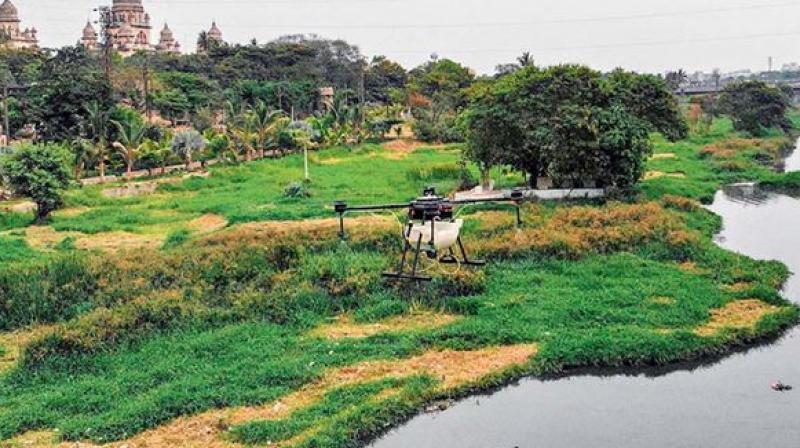Drone\'s the way

The GHMC has commissioned Hyderabad-based Marut Drones to spray herbicide over the lake using drones to spray herbicde over the lake using drones to curb the formation of mosquitose larvae
The mosquito mencese has been plaguing almost every human settlement around the world for time immemorial now, more so because of its associated life threatening diseases like dengue, malaria, and chikungunya. Like many other cities, hyderabad, too, has fallen prey to the desaster, as its water bodies have turned into breeding grounds for the blood-thirsty insects. to add to the woes, the hydacinths covering these water bodies turn the danger up a few notches.
Adaptation, however, is the key to suvival and evolution and Hyderabadis have sure devised a unique way to dodge the issue. The Greater Hyderabad Municipal Corporation (GHMC) has commissioned the city-based Marut Drones to use drone technology to spray chemicical over the affected water bodies so as to curb the formation of mosquito larvae. This, in turn, has also helped ease the burden off the shoulders of human labour.
Talking about the initiative, the founder and CEO of the Marut Doners, Prem Kumar Vislawath said , "We have been inthe drone buisiness for six yesrs now. In fact , it had never occurred to me that drones could be used to curb mosquito breeding untill my parents complained to me about the menance they had to deal with just because they live in the vicinity of a lake."
" I first heared from Hari Chandana IAS, Zonal Commissioner, West Zone GHMC in February , when she called to discuss with me the possibility of using drones to spray herbal herbicide over lakes. Followinw the initial discussion, we conducted several trail rounds over Gurunatha Cheruvu, Malkam Cheruvu, the Musi River near High Court, and Bapughat. The primary advantage of using drones is that they can acess the entire lenght and breadth of the water body ,Which is an impossible feat for human labour to achive. The custome-made drones are loaded with a herbicide comprising of neem, citrodora, and cow dung -- all of which are known to be effective in eradicating mosquitoes,'' he added.
Elaborating on the technology behind the drones deployed to the task, the IITGuwahati graduate sade, "The payload capacity of the drones we're using is 10 liters and flight time, 30 munites per battery. They can be operated both manually and in autopilot and can fly up to 6 feet from the ground. They spray at the rate of an arc every 10 minutes. With all customisations in place, these drones are priced anywhere from Rs 10 -- 12 lakh."
Prem and his team of experts are now trying to devise an AL-based platform to predict mosquito density and larvae count to generate mosquito maps elucidating their distribution on grounds of gender species, and sub-species, and to give alerts in cases of emergency situations and disease outbrakes.
The T-Hub incruberted start-up mentored by the Research and Innovation Circle of Hyderabad startup -- Thanos Technologies --- to conduct research and further customise their mosquito eradication drone technology. "Drones have gained worldwide recognition for transforming processes with their superior capabilities. We plan on using drones for thermal analysis of solar plant and corridor mapping in forests to identify encroachments," Prem said.

